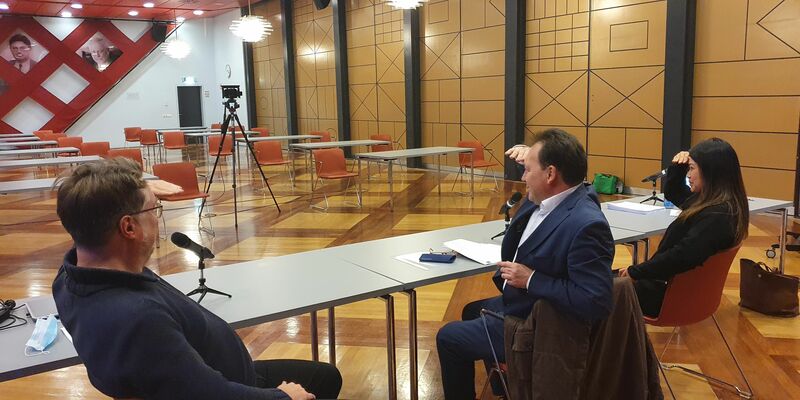
- The University , Student
- 09/12/2021
Newcomer ONS wins a seat on the University Council
During this week’s election for the candidates standing for the three student parties on the University Council, Groep-één lost one of the six seats it currently holds to newcomer ONS. DAS Eindhoven retained three seats. Rik Lubbers, chair of ONS, said that he secretly had hoped for a few more seats, but that he was satisfied with the result. For the first time in many years, voter turnout dropped below thirty percent.
The members of the Polling Agency presented the results of the elections for the staff and student factions on the UR and the departmental councils in a completely deserted Senate Room (see main photo) this afternoon. The members of the Services Council also stood for election. The student groups decided to await the election results at different locations on the campus and elsewhere.
Voter turnout for the election of the nine student members on the UR, which takes place annually, was at 29.15 percent this year. Lower than the usual voter turnout, which is above thirty percent. Turnout numbers may have been influenced by a bug in the digital voting system, which made voting difficult last Tuesday and because of which people still had until twelve in the afternoon today to cast their vote. The members of staff faction PUR were also up for election, which happens once every two years, and voter turnout for that election was at 33.16 percent.
Newcomer ONS
Newcomer ONS, led by chair Rik Lubbers, immediately scored a success during the student election: the party won a seat. Lubbers said that he is happy with the result, and goes on to pinpoint his faction’s main area of focus during the upcoming year: “The Education and Examination Rules, also known as the OER, needs to become more visible within TU/e, and it needs to become easier to read as well,” Lubbers says.
“Basically, the OER is the contract a student enters into with the university; therefore, its content needs to be clear to everyone. During my three years on the department council of Mechanical Engineering, we submitted an endless list of improvement points, but no action was ever taken. Now that we have a seat in the UR, I want to actively work towards achieving this, and I want to put my time and energy into it.” Lubbers says that ONS can’t address every single dossier, “but I expect that we will agree with the other two groups on who will tackle what.”
Koen de Nooij, chair of Groep-één, takes a similar stance. “With five seats, we are still the largest faction on the UR, and I believe that this year’s campaign is one of the best we ever had. We actually kind of expected ONS to win one seat. We definitely want to collaborate closely with ONS and DAS, because there are many important issues awaiting us in the coming period, and we will need to collaborate on those issues. But we are very happy with the fact that we are still the largest faction, and we will certainly celebrate tonight.”
Changes PUR
Some changes will also take place within staff faction PUR. Four of PUR’s current nine members will be succeeded by newcomers. This time around, there is a significant inflow of researchers of foreign origin, including PhD candidates Aravind Ravi and Sudhanshu Chouhan from India, and Spanish born program manager Victor Sánchez Martín, who works at the Cyber-Physical Systems Center of the department of Electrical Engineering. Researcher and lecturer Michel van Eerd, who works at the same department, is also among the newcomers who will hold a seat on the UR during the next two years.
You can find all the election results here.
Discussion